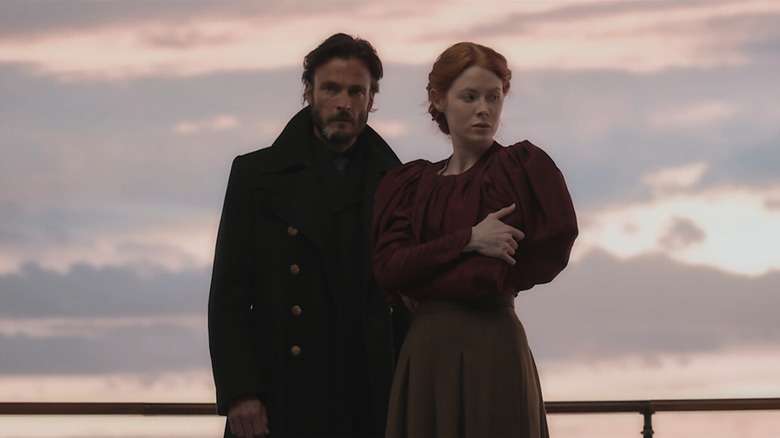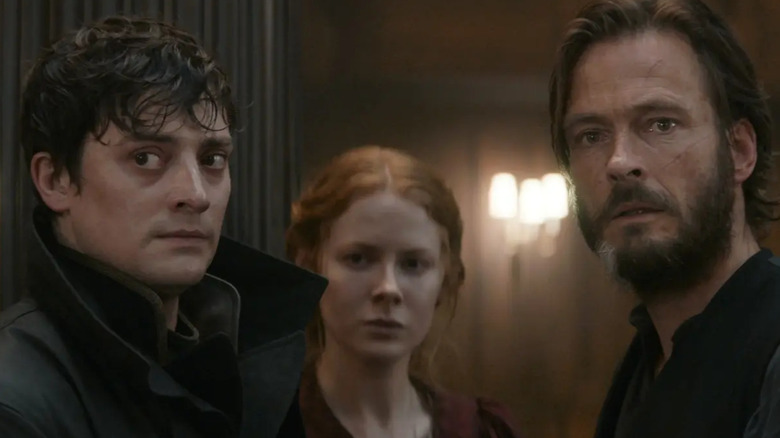Why Netflix Canceled Its Sci-Fi Mystery Series 1899
Netflix has an embarrassment of riches in its library of shows in the app's catalogue, and it can be hard to find a great show among that sea of options. But, one quick scroll on social media shows anyone paying attention that there are dedicated fanbases for every show that sails onto the Netflix's Top 10. Not too long ago, "1899" was riding high on the streaming service and eyeing up a possible season 2 after mostly positive reviews from critics and a bubbling fanbase in different corners of the web. Netflix decided to cancel the mystery thriller, despite those strong numbers, and it really came down to budgetary concerns and other risks associated with the production moving forward.
"1899" came to Netflix from Jantje Friese and Baran bo Odar — both creators already darlings of the service for their work on "Dark" back in 2017 — with high expectations, the show had the wind at its back in the early going. First impressions reign supreme in the streaming era of TV and movies, just getting that positive word of mouth can be the difference between literal life and death for several programs beyond Netflix's scarlet confines. A first season of a mystery show is hard to get above a 70% on Rotten Tomatoes in such a crowded marketplace, and "1899" stands at 75% audience score right now.
It's reasonable to assume that over time, just like "Dark" managed to do before it, "1899" would have been able to build up some steam in the ensuing seasons with more people hearing about the show and the way that fan culture loves tackling mysteries together over the last 5 years. The formula is there, and Netflix could have pursued it if they had cared to, but there was just one big problem: Why chase a small fish when you already have a certified whale on the line? It just didn't make sense to the people up top at that point in time.
1899 got canceled because it was too expensive and it released in an unlucky spot
A quick scan of Netflix's Top 10 rankings is going to yield a diverse smattering of shows and movies, with live-action mainstays like "One Piece" and "Stranger Things," some dramas like "Bridgerton" or "Instant Family," and reality TV programming like "Too Hot to Handle" or "Love Is Blind." Just like in broadcast television, executives are going to give the nod to any reality programs because they're cheaper to make if the studio is forced to choose between scripted shows and these budget options. (There's nothing inherently wrong with liking reality TV, but it's hard to miss the fact that its presence has actively hurt narrative storytelling on television.)
Unfortunately for "1899," this isn't even the case, because it aired alongside another scripted program in its premiere week, "Wednesday." As soon as that happened, the end was probably nigh for the enjoyable "Dark" successor, as Jenna Ortega's delightful turn as an "Addams Family" character was going to clobber whatever it debuted against. The viewing numbers from Netflix itself show that stark contrast for even the most ardent "1899" defender, as "Wednesday" brought in a dizzying 507,700,000 hours watched while poor "1899" settled for 51,800,000 through the first 7 months on the service. That's just too much to battle against for a slightly expensive show on the bubble already.
Add in some allegations of plagiarism, that have since been rescinded and a statement from the creators on social media (h/t for UNILAD for screengrabbing the exchange), and the picture begins to form that Netflix made the easiest decision for itself as a business. They didn't even have to confront any of the controversy if they just pushed what was popular and relied on the already bursting stable of shows they already had under their umbrella. So, "1899" joined the other shows, essentially lost at sea with little hope of escaping the streaming version of the Bermuda Triangle.

